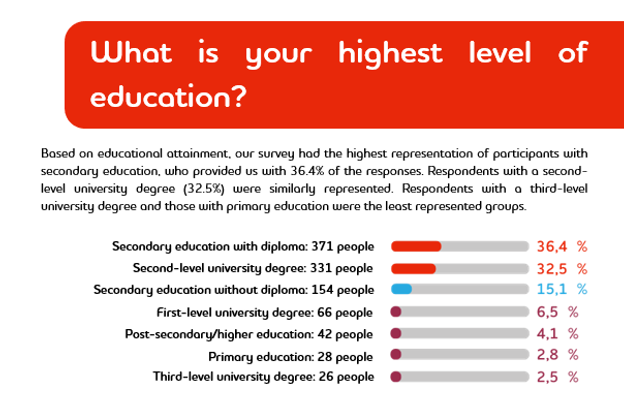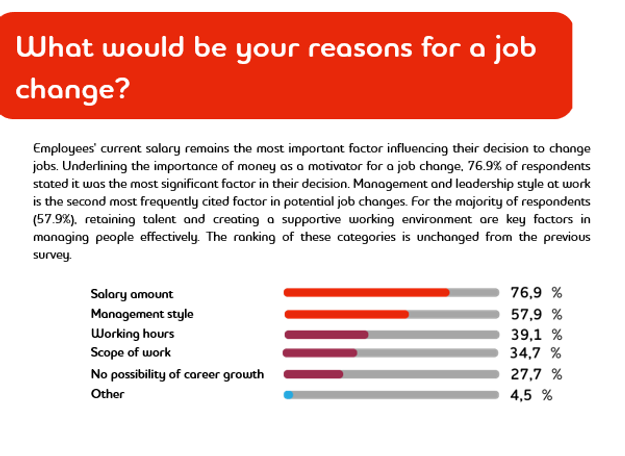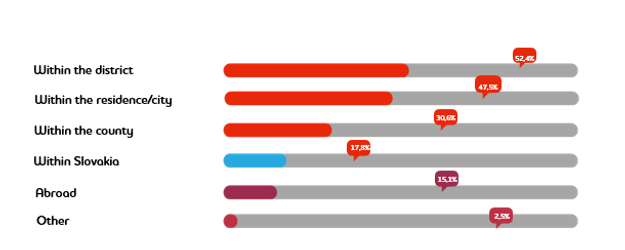Talent Solution, a recruitment company with more than 21 years of local market experience in Slovakia, has conducted their annual candidate survey and has shed light on the motivations and preferences of job seekers in the country.
The survey, which received an impressive 1,018 responses, offers valuable insights for employers and HR professionals seeking to understand the needs and expectations of job seekers in the Slovak labour market. The survey sample consisted of 61% women and 39% men, with the majority falling within the 33-40 age bracket. It also provided an overview of the respondents' education levels, with secondary school qualifications being the most common, while primary education and third-level university degrees were the least represented groups.
Geographically, the highest number of responses came from the Bratislava and Košice region, while the Banská Bystrica Region had the lowest number of respondents. One of the key findings from the survey was that almost half (49%) of the respondents were actively looking for a new job, reflecting a potential shift towards an employer-driven labour market. This represents a significant 15% increase compared to the previous year's survey.
The survey also delved into the top benefits job seekers prefer from their employers. Flexibility in working hours, 13th/14th salary, the option to work from home, salary increments, meal vouchers beyond minimal entitlement, and additional leave were identified as the most sought-after benefits. While respondents ranked flexible working hours first in 2022, in 2023 the 13th/14th salary (more than half of respondents) ranked first, which can be connected to the increased costs of living and economic development in the country.
When it comes to reasons for considering a job change, the survey results highlighted factors such as the lack of career growth opportunities, job content, leadership style, salary amount, working hours, and location.
The survey respondents confirmed that salary remains the primary factor in the job selection process. It has maintained its leading position as the TOP criterion for individuals. The ranking of job selection factors according to importance remains consistent with the previous survey. Job performance represents the second most critical aspect, followed by working hours and workplace location. While the ranking remains unchanged, there has been a significant evolution in the salary factor. Compared to the previous survey, the importance attributed to salary has increased by 7%. The categories of working hours and location also registered a more significant increase of more than 5%. That highlights the increased prominence of these elements in the decision-making process.
Interestingly, a majority of respondents (59.8%) expressed a willingness to travel for a lucrative job offer, showcasing their openness to relocation for the right opportunity. However, 40.2% of respondents stated that they would not consider traveling or relocating even for a lucrative offer which reflects the standard in Slovakia of owning property.
As well, Slovakia has experienced a rapid increase in the minimum wage since 2014. It has grown significantly faster than labour productivity and average wages. As of January 1, 2024, the minimum monthly salary in Slovakia is EUR 750. The survey revealed that a significant 64.9% of respondents were dissatisfied with their current salary, indicating a potential area of improvement for employers in order to attract and retain top talent. According to the survey, 47.8% of respondents have seen an increase in base salary. On the other hand, as many as 44.9% of respondents reported that their wages have not changed, while 7.3% stated that their base pay has actually decreased. These percentages are comparable to last year's survey and indicate that companies have not significantly changed their strategies regarding wage policies.
The Talent Solutions survey has pointed out critical aspects of the Slovak labour market, aiding employers in aligning their strategies with job seekers preferences. With insights into demographic trends, job-seeking behaviors, and preferred benefits, businesses can better attract and retain top talent. The findings underscore the importance of salary, career growth opportunities, and work-life balance in job decisions. Notably, the increased significance of salary highlights evolving economic dynamics and the need for competitive compensation packages. By understanding and adapting to job seeker preferences, organizations can enhance their recruitment strategies and foster a more engaged and productive workforce.
This article was written by Ivana Heretik Vačoková, General Manager of Talent Solutions and published in Career Guide 2024.


 (source: Talent Solutions)
(source: Talent Solutions)
 (source: Talent Solutions)
(source: Talent Solutions)
 (source: Talent Solutions)
(source: Talent Solutions)